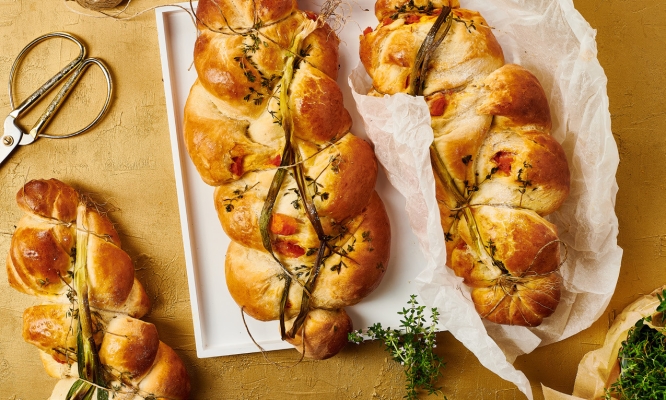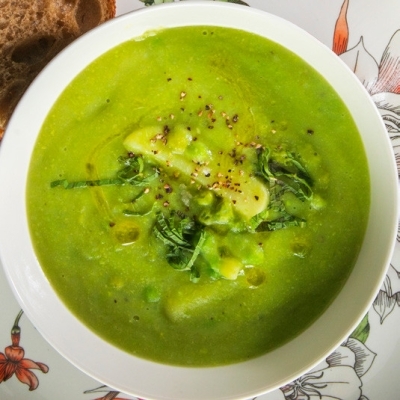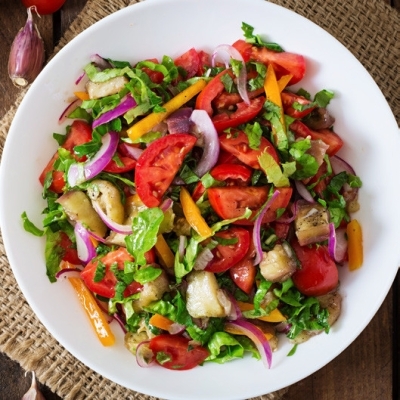Cooking Together: The Israeli Pantry
Recipes originating from the Gaza Envelope (Otef Aza)
Reviewed by Judith Cooper-Weill
The diversity of Israel's kosher cuisine is reflected in the credits for this interesting and varied compilation. The recipes highlight ingredients which are grown in Otef Aza, Israel's bread-basket, the region which suffered so appallingly on October 7 and which is struggling to recover.
Here we have a full-color illustrated presentation of popular ethnic Israeli dishes, bursting with sun-kissed tomatoes and Negev peppers, family meals, easy and inexpensive to prepare. All the ingredients and spices are readily available. These are recipes which will appeal to children and adults, simple, wholesome and satisfying, clearly set out.
There is plenty of scope for vegetarians and vegans and most of the suggestions allow individual taste and imagination to add ideas. The abundance of tomato recipes reminds me of a Provencal dinner I once served to a table of 14 when our kitchen garden was overflowing with various varieties and cherry tomatoes were beckoning from a garden rail. Tomatoes and courgettes do often ripen all at once and need to be used in short order.
The Ashkelon salad, if there are any leftovers, could make a neat gazpacho.
This is "room for everyone, plenty to go round", comfortable eating and the book with its "Taste of Israel" banner could be an appreciated gift in any season.
So what do we find?
Pea and potato soup is a refreshing version of vichyssoise, the classic leek and potato soup, good hot or cold. In fact, all the soups are fun and run the gamut of origins.
There's an all-year round honey cake using tahini and date honey and a Negev selection of multi-traditional bourrekas including a giant festive meat pie with mushroom sauce.
We're invited to make and serve Yemenite Jahnoun at home.
There's fragrant Moroccan Chicken Pastilla, Okra Kubbeh, Middle-East Borscht (Beetroot Kubbeh Soup) and a Negev version of apple strudel
There are wonderful salads using bulgur wheat: chicken tabbouleh with watermelon and mint, and an appealing ultra-fresh citrus salad with beets, nuts and lettuces.
There are recipes for challah bread including one for a challenging but irresistible "Wild Challah" pair of loaves using honey and wild thyme, olive oil and squash.
There are beef rolls using shredded asado for a picnic and a date roulade (how about silan instead of tahini?).
Caramelized Chicken Orange Lollypops make a sweet meat treat.
A refreshing Israeli Ceviche – intriguing: what are Sea Morals? (P.128). However, we're talking raw fish here (not to mention the hot summer climate) so the recipe really should specify that the fish used needs to be ultra-fresh and "sashimi-grade" in quality. The other ceviche recipe on offer uses traditional lime juice, the method suggested sounds safer and more appealing, and the ingredients are very attractive.
Spicy Fish Balls made with pungent local ingredients served here in a tomato sauce dip but could be adapted to fish kebab quite easily, with a yoghurt dip instead. There's a baked fish casserole with round rice and several simple cake recipes
The section on chicken is varied and extensive – they eat a lot of chicken in the Negev.First the juiciest cut, known as pargit: deboned, skinned thighs. The shawarma recipe cleverly uses lamb fat and a fragrant blend of herbs for marinating the meat before grilling it on a plancha on the stove-top. Another suggestion uses coconut cream with the addition of a sweet chili sauce for a quick and delicious dinner. The oven-baked glazed chicken legs team up with "orange vegetables" for a wholesome meal. Plain baked (whole) chicken uses whatever vegetables you fancy with a herby "rub". The Jerusalem-style mixed grill takes giblets (hearts and spleen), lots of spices, red onions and olive oil: serve with hummus, tahini and pickled mango (amba).
There's a delicate version of chicken soup and dumplings from the Persian kitchen: Gondi Soup. It doesn't bother telling you how to make the soup, just concentrates on the fragrant and magnificent dumplings, made with chickpea flour and spices enlivening the chicken breast and onions.
Before moving on to schnitzel recipes, we have pan-seared breast of chicken with Negev cherry tomatoes intensified by sundried tomatoes and chili pepper in a glaze of balsamic vinegar. The crispy schnitzels come with corn or are plain fried in aromatic coating. A chicken upside-down cholent rounds up this section in a Jerusalem-Sephardic version of the traditional hearty Sabbath lunch complete with macaroni.
We haven't quite finished with chicken, however, as the minced meat in Section 10 gives us albondigas (soup) and kiddie-favorite baked patties on a stick as well as chicken balls with white beans.
The minced meat section of the book is pure kibbutz galuyot in inspiration. The Iraqi meatballs come with dried fruit (apricots and raisins), the Persian ones use heaps of fresh herbs and silan (date honey) as well as basmati rice, the North African meatballs in tomato sauce are distinguished by the spice mix and the inclusion of zucchini and then there are lamb balls with chickpeas and preserved lemon, very Moroccan – although the terms "cutlets" is misleading (possibly a mistranslation?) since these are balls made of ground lamb rather than lamb chops. Jewish cooking in Syria and Lebanon is represented by the Sinia Kebab incorporating both beef and lamb with baby eggplants and spices such as baharat, turmeric, cardamom and baking soda, served with tahini.
There's even a nod to fast food with Arayes, meat-stuffed crispy pita where the meat is mixed with a spicy paste and pine nuts stuffed into pita halves to be grilled.
Finally, a dessert which brings home the tragedy of October 7: Rachel's chocolate-chip cookies feature a heroine from Ofakim, Rachel Edri. She saved herself and her husband (who has since passed away) on that day by feeding the Hamas terrorists who had forced their way into her home with these cookies, and distracting them for 17 hours until a rescue team arrived.
We can only hope, as the compilers of this book say in their introduction, that "The farmers of the region will return to their land, and it shall bear its fruit once more.











Comments